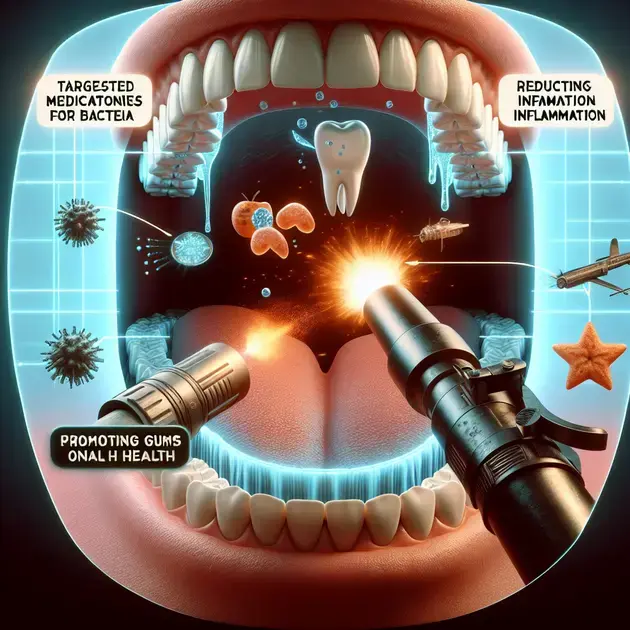When it comes to managing periodontitis, finding the right medication is crucial. This comprehensive guide will explore the most effective options available to treat this common dental condition. Periodontitis, which affects millions of people worldwide, can lead to serious complications if left untreated.
With advancements in dental technology and research, there are now several highly effective medications specifically designed to target and control periodontitis. From antimicrobial mouth rinses to antibiotics and non-surgical treatments, this guide will cover everything you need to know to combat this condition and maintain optimal oral health.

Effective Medication Options for Periodontitis Treatment
Periodontitis is a serious gum infection that damages the soft tissue and destroys the bone supporting your teeth. It can lead to tooth loss if not properly treated. In addition to professional dental treatments, medications can play a crucial role in managing periodontitis. Here are some effective medication options to consider:
1. Antibiotics
Antibiotics are commonly prescribed to combat the bacterial infection causing periodontitis. They can be taken orally or applied directly to the infected area. One popular antibiotic for periodontitis is doxycycline, which helps reduce inflammation and control the growth of bacteria. You can consult with your dentist or periodontist to determine the best antibiotic treatment for your condition.
2. Antiseptic Mouthwash
Antiseptic mouthwashes containing chlorhexidine or other antibacterial ingredients can help reduce the amount of plaque and bacteria in your mouth. Using an antiseptic mouthwash as part of your daily oral hygiene routine can complement professional cleanings and improve the effectiveness of your treatment.
3. Enzyme Suppressants
Enzyme suppressants like subantimicrobial-dose doxycycline (SDD) can help inhibit the enzymes that break down the gum tissue in periodontitis. By blocking these enzymes, SDD can slow down the progression of the disease and promote tissue healing. Your dentist may recommend using SDD in combination with other treatments for better results.
These medication options, when used in conjunction with professional dental care and good oral hygiene practices, can significantly improve the outcomes of periodontitis treatment. Be sure to follow your dentist’s recommendations and attend regular check-ups to monitor your progress.
Understanding the Importance of Targeted Medications
Targeted medications play a critical role in the treatment of periodontitis by specifically addressing the underlying causes of the disease. Unlike general medications, targeted medications are designed to work on particular aspects of the condition, such as bacterial infection or inflammation. Here’s why targeted medications are essential in managing periodontitis:
1. Precision Treatment
Targeted medications allow for precise and directed treatment of the affected areas in the mouth. By focusing on the root cause of periodontitis, these medications can effectively combat the infection and promote healing without affecting the rest of the body.
2. Minimized Side Effects
Since targeted medications are tailored to address specific issues related to periodontitis, they are less likely to cause systemic side effects compared to broad-spectrum medications. This targeted approach reduces the risk of adverse reactions and increases the safety profile of the treatment.
3. Enhanced Efficacy
By targeting the key factors contributing to periodontitis, such as bacterial overgrowth or inflammatory response, targeted medications can deliver superior outcomes. They can help control the progression of the disease, reduce symptoms, and improve the overall health of your gums and teeth.
Speak to your dental provider about the benefits of targeted medications for periodontitis and inquire about specific options that may be suitable for your condition. With the right combination of targeted medications and professional care, you can effectively manage periodontitis and preserve your oral health.

Understanding the Importance of Targeted Medications
Effective medication for periodontitis plays a crucial role in the management of this serious gum disease. Targeted medications specifically designed to combat periodontitis are essential for achieving successful treatment outcomes. These medications are formulated to address the root cause of the disease, targeting the harmful bacteria that lead to inflammation and damage to the gums and supporting structures of the teeth.
Utilizing targeted medications in the treatment of periodontitis is vital for effectively controlling the progression of the disease. By directly targeting the bacteria responsible for the infection, these medications can significantly reduce inflammation, promote healing, and prevent further damage to the gums and surrounding tissues. This targeted approach helps to not only treat the symptoms of periodontitis but also address the underlying cause of the disease.
Compared to general oral health products, targeted medications offer a more focused and intensive treatment option for periodontitis. These medications are specifically formulated to deliver active ingredients deep into the gum pockets where bacteria thrive, allowing for more effective eradication of the infection. By targeting the specific pathogens involved in periodontitis, these medications can help restore gum health and prevent the recurrence of the disease.
Overall, the importance of targeted medications in the management of periodontitis cannot be overstated. These specialized treatments are essential for addressing the root cause of the disease, promoting healing, and preventing further damage to the gums and supporting structures of the teeth. By incorporating targeted medications into a comprehensive treatment plan, individuals can effectively manage periodontitis and improve their overall oral health.
Exploring Comprehensive Treatment Approaches
When it comes to treating periodontitis, a comprehensive approach that combines targeted medications with other therapeutic interventions is key to achieving successful outcomes. Comprehensive treatment approaches encompass a range of strategies aimed at addressing the various aspects of periodontal disease and promoting overall gum health.
In addition to targeted medications, comprehensive treatment for periodontitis may include professional dental cleanings to remove plaque and tartar buildup, scaling and root planing to deep clean the gum pockets, and in severe cases, surgical interventions to address advanced gum disease. These treatments work in conjunction with targeted medications to control infection, reduce inflammation, and promote healing of the gums.
Alongside these clinical interventions, lifestyle modifications such as smoking cessation, dietary changes, and improved oral hygiene practices are also important components of a comprehensive treatment approach for periodontitis. These lifestyle factors can impact the progression of the disease and the effectiveness of medication, making them crucial considerations in overall treatment planning.
By taking a comprehensive approach to the treatment of periodontitis, individuals can address the multifaceted nature of the disease and optimize their chances of successful outcomes. From targeted medications to professional cleanings and lifestyle modifications, each component plays a critical role in managing periodontitis and preserving overall gum health for the long term.
Conclusion
In conclusion, the significance of targeted medications in the treatment of periodontitis cannot be emphasized enough. These specialized medications are specifically tailored to combat the root cause of the disease by targeting the harmful bacteria responsible for inflammation and damage to the gums and teeth structures. By utilizing targeted medications, individuals can effectively control the progression of periodontitis, reduce inflammation, promote healing, and prevent further damage to the oral tissues.
When considering comprehensive treatment approaches, the combination of targeted medications with other therapeutic interventions is crucial for successful outcomes in managing periodontitis. This holistic approach includes professional dental cleanings, scaling and root planing procedures, and if necessary, surgical interventions. These treatments, along with lifestyle modifications like smoking cessation and improved oral hygiene practices, work harmoniously to address the multifaceted nature of periodontal disease and enhance overall gum health.
By incorporating targeted medications as a cornerstone of the treatment plan and complementing them with various interventions, individuals can optimize their chances of effective management of periodontitis, prevent disease recurrence, and preserve long-term oral health. From targeting specific pathogens deep in gum pockets to promoting healing and preventing further damage, the comprehensive approach to periodontitis treatment ensures a well-rounded strategy for combatting this serious gum disease.



